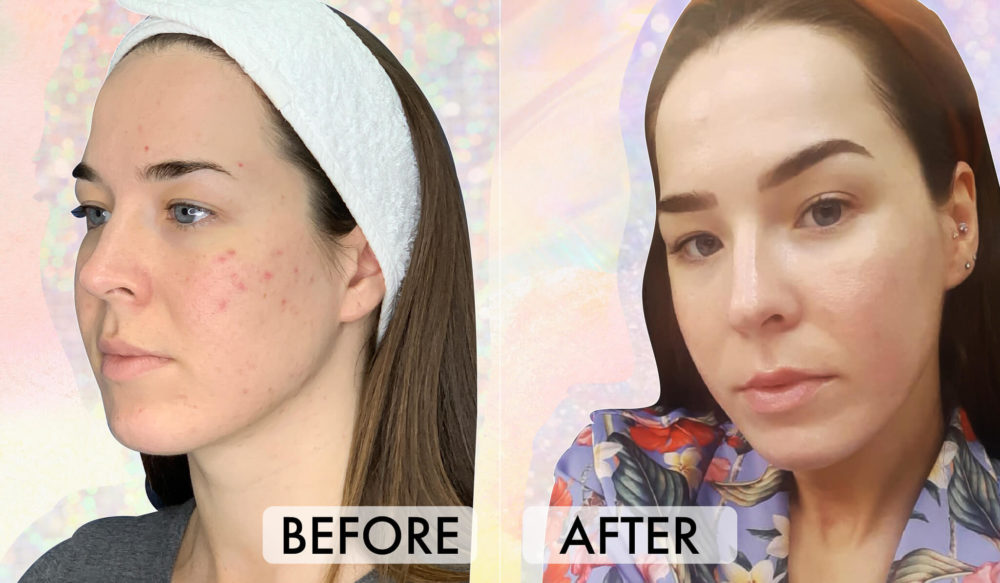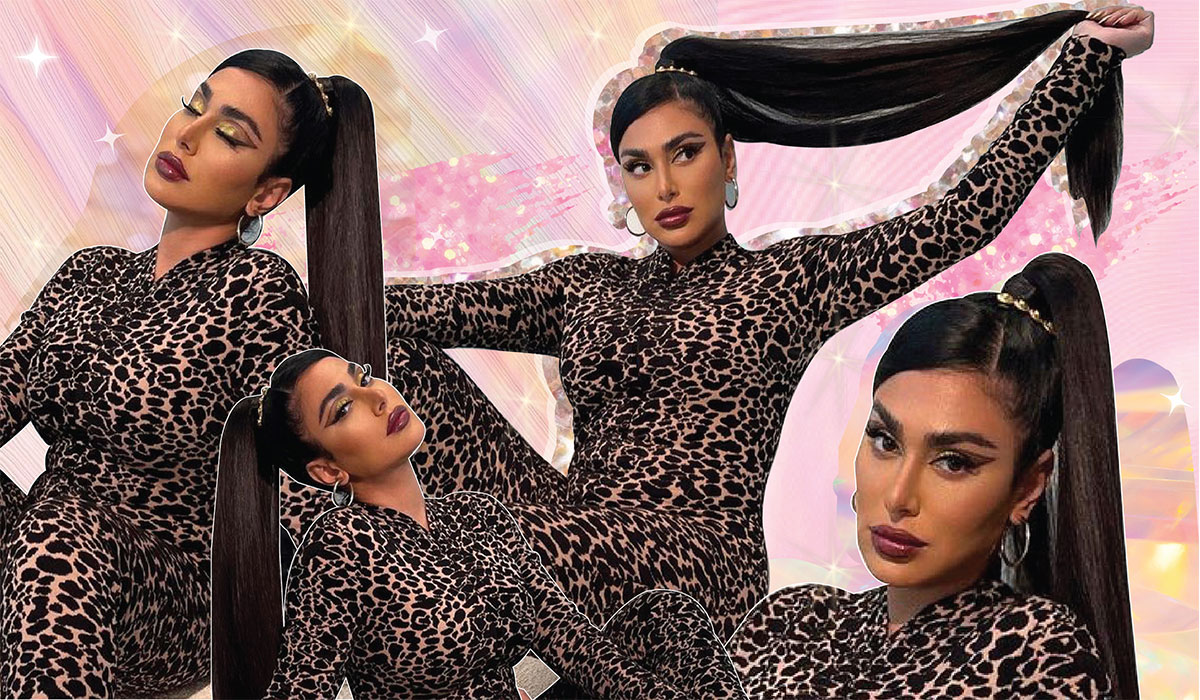Derms Answer The Weird Questions You'd Never Ask Out Loud
 via Giphy
via Giphy
There are a million skin-related q’s we think about 24/7, but instead of turning to your BFF source for answers (aka Google), you should probably get an answer from a trusted expert. Whether you’re confused about your skincare routine or hair loss, worried about a suspicious mole, or have ever questioned if beauty treatments are addictive (spoiler alert: they can be), then you’re going to want to keep reading. We asked the top derms, estheticians, and dermatopathologists (aka specialists in cutaneous diseases at a microscopic and molecular level) the hard-hitting questions so you don’t have to. You’re welcome.
1. Should I be skipping night cream to let my skin breathe at night?
 via Giphy
via Giphy
If you were to ask lead esthetician Lisa Mammeri at The Spa by Valmont in Switzerland, she would say never! “It’s one of the biggest misconceptions I hear. First of all, the skin does not breathe, because it does not have lungs! Second of all, if the skin has to eliminate sweat, sebum, or toxins, it will do it no matter what.” BRB, just running to grab some night cream. “Valmont products are formulated not to clog pores, even the richest of them. And unless you’re blessed by the gods, for most people, awesome skin can only be achieved with a good skincare routine, including the application of products at night,” she adds. “Great skin things are achieved at night.” Well alright then! Check out 12 nighttime skin rituals for better skin by morning.
2. Why are my eyes puffy in the morning?
 via Giphy
via Giphy
When you wake up with overweight bags you’d like to check, just take Mammeri’s advice and force yourself to blink as much as possible to start the fluids moving. “As we are lying down in bed, the circulation of the fluids slows down making the thin skin around the eyes swell. Also, during sleep, we don’t blink, so blinking for the eyes is like walking for the legs,” she says. “Do not exaggerate the mimic [of blinking], because you don’t want to create or deepen any lines, but look up, look down, and look sideways. Even just a movement of the eyeball will help. Skincare wise, use eye contour creams that contain circulation-boosting ingredients such as caffeine or green tea.” See our fave eye creams here.
3. I eat healthily and exercise, but my skin doesn’t improve. What am I doing wrong?
“Sometimes the skin has its own ways, but in my experience, things can get worse before they get better,” says Mammeri. One common mistake she’s seen is people overdoing things, or having a poor diet, which is not great for the skin. “When you lack good fatty acids, the skin can be dry and shriveled, so have your dose of nuts, avocado, or virgin oils every day, and nourish your skin with a few drops of beauty oil as well. Exercising intensely is really good for the health and for the body shape, but can create a lot of oxidative stress within the skin. (You know when you do that deadly series of squats and don’t breathe properly.) So after your workout, load your body and skin with antioxidants – any fruit and veggie really, but berries are particularly known for their high levels of antioxidants.”
4. If I apply my anti-aging products to my hands, elbows, and legs, will they make these areas look younger too?
The short answer? Yes. “Applying an anti-aging cream that has retinoids as an active ingredient will create cellular skin turnover, thus providing anti-aging benefits,” explains SKINNEY Medspa co-founder Adriana Martino. We like Paula’s Choice Resist Retinol Skin Smoothing Body Treatment, $25, for this very purpose.
5. Are beauty treatments addictive?
 via Giphy
via Giphy
You may think this is a crazy question, but according to Boston-based dermatopathologist Dr. Gretchen Frieling, some people believe beauty treatments are 100% addictive and now that we’re thinking about it, we have to agree. “While it’s easy to be bombarded by shows like Botched, or hear the news stories about celebrities who have gone too far in their search for eternal beauty, routine beauty treatments like face peels, botox and facials are not necessarily addictive,” Frieling says. “If a person is overdoing their treatments however, it may stem out of a psychological issue with confidence or body-dysmorphia.” Sound like you? Then ask your doc honestly whether or not you’re going overboard. “It’s important for doctors to act ethically in advising against treatments for patients when it’s not necessary, or too soon after a previous treatment. Many dermatologists, dermatopathologists, estheticians, and cosmetic surgeons pride themselves on their counseling of patients and their honesty when a patient is not the right candidate for a procedure,” she adds.
Side note, we recently requested Botox from a doctor only to be told he thought we didn’t need it. Instead, he suggested PRP with Mesotherapy and within 2 weeks we have seen amazing results in our skin; for fine lines, texture, and fading of acne scars. Stay tuned for our full review!
6. If Botox is a toxin, is getting Botox injections poisonous to me?
“Many patients will come into our practice with the worry that they are injecting poison into their faces, even though they’ve chosen to have a botox treatment,” Frieling says. “This misconception is due to the fact that Botox is made from a neurotoxin called botulinum toxin and the word toxin can scare people.” Ugh, yeah! We’re here to save you Botox-loving babes from freaking out though, because as she’s quick to point out, Botox is just a chemical that relaxes the muscles into which it’s applied, while addressing fine lines, wrinkles, and increased deepening of these lines by expression and movement.” Considering more than six million treatments are done in the U.S. each year, we’re giving it the HB stamp of approval. Plus, Botox is also used to combat migraines, sweating disorders, and even things like, urinary incontinence? There’s a reason it’s called a #BotoxParty.
7. I love the sun and tanning, SO can I just tan all the time and address wrinkles with peels and Botox?
 via Giphy
via Giphy
Hard no! Why do you think self-tanners and our N.Y.M.P.H. Not. Your. Mama’s. Panty. Hose. were invented? “While tans make people feel great about themselves, they expose our skin to the unforgiving and dangerous effects of UVA/UVB rays, which can affect much more than the overall pigment of our skin,” Frieling says. “Overexposure to the sun can accelerate signs of aging, prompting more wrinkles in the skin, dehydrating the outer layers of the skin, altering DNA, and depleting the skin’s protective natural barrier.” Yeah… So not worth it. And even though Botox, a skin peel, or a laser treatment may help with short-term side effects, you’re still unnecessarily exposing your body to melanoma. “Beyond just a few wrinkles, you are putting the process by which your skin cells operate at risk. This, in the long run, would not be sustainable for your skin,” she adds.
Conclusion: If you want to go in the sun, SPF 30 with a 5-star UVA rating is essential, but if you want to tan, we recommend faking it! Check out our fave sunscreens here.
8. How can I tell if new or darkening skin spots are serious?
According to NYC-based dermatologist Dr. Hadley King, detecting melanoma is one of the most important – and most challenging – responsibilities of dermatologists. Although you should be giving yourself a regular at-home exam (completely undressed, in front of a full-length mirror, with a hand-held mirror, in an area with good lighting), King also recommends a yearly exam by a board-certified dermatologist to check any shady-looking spots. When self-examining, she says to look for the ABCDEs:
- If you draw a line through the middle of the mole and the sides do not match, that’s border irregularity.
- Color variegation. Most benign moles are all one color, often a single shade of brown. Having a variety of colors is another warning signal. There may be different shades of brown, tan or black, or there can be red, white and blue.
- Big or getting bigger. Benign moles usually have a smaller diameter compared to malignant ones. Melanomas are usually larger in diameter than 6 mm, about the diameter of a pencil eraser, but early melanomas can be smaller than this.
- Common benign moles tend to look the same over time, but if a mole is changing in size, shape, color, elevation or another trait, or if there is any new symptoms such as bleeding, crusting or itching, then it’s important to see a dermatologist.
9. How can I really slow down hair loss?
 via Giphy
via Giphy
Can’t even with the dreaded drain clog, thanks to your hair loss as of late? We hear you and so does King. “Female patterned hair thinning is related to our hormones and the sensitivity of the hair follicles to the hormones, which is primarily genetically determined,” she says. Therefore, hormonal prescription medications can be very effective in making the scalp hair thicker, as well as over-the-counter minoxidil.” In terms of products that help with hair health, King swears by the Truth Vitality line of shampoos, conditioners, and Advanced Complex. “These products contain copper peptides and copper chloride, which can increase cellular reproduction and lengthen the hair life cycle. They also contain caffeine and beta-sitosterol, which can inhibit 5 alpha-reductase (which promotes hair thinning),” she adds. And if all else fails, consider taking a biotin supplement and eating a well-rounded diet with plenty of protein, so you don’t have any vitamin or mineral deficiencies.
Check out our expert’s guide to hair loss causes and the best treatments.
10. What’s up with those bumps down there?
 via Giphy
via Giphy
“Anytime there’s a new spot ANYWHERE on your body, you should have it evaluated by a professional, especially if it’s not going away, or getting bigger, or you feel itchiness or pain,” says board-certified dermatologist and co-founder of LM Medical, Dr. Morgan Rabach. “We’re trained to diagnose and treat everything from razor burn bumps to genital warts and other lesions and while it’s super tough to generalize what these could look like (because every spot can look different, on different people, on different skin tones), you don’t want to let it go unchecked in case it’s potentially cancerous.” FYI: even cancer can form in private areas. Rabach also insists no one should feel uncomfortable about stripping down and asking for an up-close and personal look-see. “It’s part of life… We’re not embarrassed, so you shouldn’t be either,” she adds. True story! Check these nine things you’re gynecologist wants you to know!
11. If my scalp is flaky AF, should I stop shampooing so much?
Real talk: A dry flaky scalp can feel embarrassing, but it doesn’t have to be. “Many people think that washing your hair more, causes more dryness and flaking, but actually it’s the opposite,” explains Rabach. “The flaking comes from yeast that lives on the skin (we all have it, it’s not a hygiene problem) and washing the yeast away with the proper shampoo can really keep the flaking at bay.” Lesson learned: Ask your derm for a prescription or recommended over-the-counter shampoo. We love natural shampoos that contain tea tree, which is both anti-fungal and anti-bacterial and helps to soothe and calm the scalp.
What questions would you like to ask an expert? Let us know in the comments below and if we haven’t got an answer, we’ll ask the experts for you!























Leave a comment